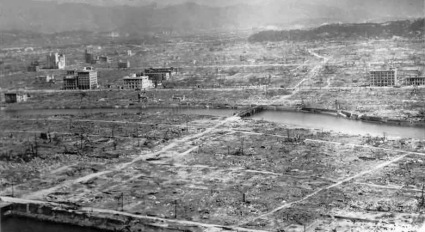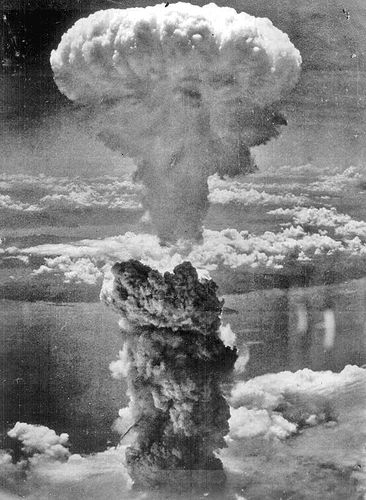On the 62nd anniversary of the atomic bombing of Hiroshima and Nagasaki, many bloggers found themselves this week reflecting on the history of how World War Two came to a close, on the way that this history is viewed and taught within their own country, and on the connections between this history and current events. In the United States, a new uncensored HBO documentary, which features testimonial from survivors of the bombing (hibakusha), promises to re-open debate on the motivations for use of the atomic bomb; the anniversary was the topic of discussion in other English-language media shows in as well. Meanwhile, in Japan, the Nagasaki Broadcasting Company has posted translated interviews with survivors of the atomic bombing, interviews which, as one blogger has noted, everyone owes it to themself to read.
Interview with director Steven Okazaki about his documentary White light, black rain
The continuing relevance of the atomic bombing of Hiroshima and Nagasaki in Japanese political affairs was highlighted just a few weeks ago when former Defense Minister Kyuma Fumio made his famous statement that the bombing “could not have been helped”. The statement caused an uproar which culminated in his eventual resignation.
This week, bloggers in Japan and across the world discussed the atomic bombing of Hiroshima and Nagasaki. Blogger k2-s describes their experiences as a kid hearing stories about the bombing:
先日の広島に続き今日は長崎の原爆の日ですね。あと数日後には終戦記念日です。
私が子供のころ、祖父や親戚の人からよく戦争のことを聞かされました。空襲で防空壕に逃げ込んだときの話や、機銃が自分の目の前で撃たれていったこと、自分の家が燃えてなくなってしまったこと、そして目の前で人が亡くなっていくこと。
街を歩くと南方から帰ってきたという人たち、手がなかったり足がなかったりする人たちが街行く人にしきりに何かを訴えかけていたり。
Following Hiroshima a few days ago, today is the day when the atom bomb was dropped on Nagasaki. In a few days it will be the anniversary commemorating the end of the war.
When I was a kid, I heard a lot about the war from my grandfather and other family relatives. Stories about how, during aerial attacks, they would take refuge in air-raid shelters; about machine gun fire flying right by their eyes; about their own home burning down; and about seeing people die right there in front of them.
Walking in the city, [you could see] people who had returned from the south — people with arms missing, legs missing — repeatedly pleading for things from people going to the city.
ちょっと町外れに行くといたるところに防空壕のあとがあったり。
そして、この時期になると今よりももっともっと戦争について、平和についてみんなが考えていたように思います。戦争から時がたてば、それを体験した人も少なくなるのは当然でしょうし、人の記憶の中からも遠ざかっていくのは仕方のないことかもしれません。
でも今も地球のどこかでむごたらしいことが起きていることは事実ですし、絶対に忘れてはなりません。そのことをしっかり子供たちに伝えるのも大人の役目でしょう。
Outside of town, there were the remains of air raid shelters in every nook and cranny.
And then also, when this time of year approached, it seems to me that everybody thought much much more about the war, and about peace, than they do now. As the time since the war increases, it's natural that the number of people who experienced it decreases, and peoples’ memories [of the events] move further into the distance, nothing can really be done about this.
But now as well, it's a fact that somewhere in the world there are gory things going on, so we should not forget. It is the role of adults to take care and transmit to children the story of what happened, is it not?

Aftermath of the atomic bombing of Hiroshima
Blogger sana, who just recently moved to Hiroshima, explains however that conveying this story has been very difficult in the past:
テレビでも、原爆記念日に合わせていろんなドキュメンタリーを放送しています。
私は今まで、被爆者の方こそが、原爆反対を積極的に働きかけたりしていると思っていました。
でも、それは違っていました。
原爆投下から60年経って、ようやく原爆について話すことができたと。
それまで、友人知人、家族にも誰にも話さず封印してきたと。
誰にも話さず、話せずにいた長い年月を知ったとき、本当の悲しみを垣間見た気がします。
I had thought that the victims of the atomic bombings had been actively involved in opposition to atomic bombs.
But actually this is not the case.
60 years have passed since the dropping of the atomic bombs, and finally they are now able to talk about the atomic bombing.
Up until now, they had been sealing themselves off, talked about it neither to friends, nor to acquaintances, nor to family members.
In knowing about it but not being able to talk to anybody for so many years, I think that they must have caught a glimpse of true sadness.
でも、被爆者の方も平均年齢74歳になって、次の代に伝えることが難しくなっています。
だからこそ、自分が語らなければと、
封印していた気持ち、被爆当日の経験を涙ながらに話していました。
そんな方が少なくありません。
For this reason, knowing that these things must be said,
with tears in their eyes, [the victims] spoke about the feelings that they had buried and their experiences from the day of the bombing.
There are many people who did this.
One of these people was quoted in a blog post at komonet describing their experience:
「ある日突然一緒に遊んでいたクラスメート達が亡くなっていった。そして遊び場だった多くの川はあまりの喉の渇きに水を求める人で埋め尽くされた。
けれども自分は生き残ってしまった。その無念の思いと一緒に生きてこれなかった幼なじみへの申し訳ない気持ちは今でも心の中で整理できない。
そのことはとてもつらすぎて今まで話す勇気はなかった。しかし、未来を託すあなたたちには話さなければならない。」
But I survived. Even now, however, I am still not able to sort out inside me the sad thoughts and the feelings of regret I have that my childhood friends could not live to be here with me today.
These things were so horrible that up until now I didn't have the courage to speak about them. However, I must talk to all of you, to whom the future is entrusted.”
While the quotes above focus on the Japanese perspective, there were also some bloggers who asked about the experience of Americans. One blogger describes the experience of hosting a home stay student from the U.S.:
ちょうど今、我が家にはアメリカ人の男子高校生Charlieがホームステイをしています。6日の広島原爆記念日のニュースでは 「広島に原爆を落とした」 アメリカの高校の教科書にはどのように記載されているか・・・などのトピックがありました。Charlieもついこの間、アメリカが広島と長崎に原爆を投下した事実を習ったそうです。アメリカでは、今までは単に事実の羅列として原爆投下は扱われていたそうですが、9・11のテロ以降、なぜ原爆投下する必要があったのか、という議論もするようになってきたそうです。
とはいってもあくまでも、原爆投下によって広島や長崎で犠牲になった人以上の人を救うことができた、という見方が大半を占めているそうですが。教育は誰にどうやって教わるかによって、こんなに違うんだと改めて感じました。原爆投下はアメリカにとって、英断だったと若者は教えられているいるんだ、と思うと恐ろしいです。もっと恐ろしいのは広島と長崎の原爆投下によってどれだけたくさんの命が瞬時に奪われ、今も心と体の傷跡や後遺症に苦しめられている人がいることを教えられていないということです。しかしCharlieが原爆投下にも、今のイラク攻撃にも疑問を抱いていると聞いて、救われるような思いがしました。
私がアメリカに留学していた時、大戦中に朝鮮半島や中国に日本が侵略して支配していた頃、日本人がどれほどひどいことをしていたか、真実を初めて知りました。異国に行って初めて識る母国の影の部分というのは相当ショックなものです。きっとCharlieも今回同じような思いをしたのではないかと思います。
Finally, in a post entitled “Nuclear weapons: the crisis in the modern age (核兵器—現代の危機)“, blogger Niphonese relates the anniversary of the bombing of Hiroshima and Nagasaki to talk in the U.S. of using nuclear weapons against Iran:
核兵器の違法性だとか,広島や長崎への原爆投下は正当だったか否かとか,そういう論議も大いに結構なのだが,もう少し現代のアクチュアルな問題に目を向けてもいいのではないだろうか。
なによりも昨春,イラン”核開発”をめぐってアメリカとイランの緊張が高まる中,ブッシュ政権が先制核攻撃をちらつかせてイランを恫喝していたことが想起されなければならない。この狂気としか言いようのない戦争策動に対し,”唯一の被爆国”であるわが国において,一体どれだけの人が危機意識を持っていたことか。一部の反核運動家などを除いて,ほとんど無関心に近い状態だったのではないだろうか。








2 comments
Perhaps some study of the defense plans of Japan’s military would be in order. The list is every bit as frightening as the bombing. Maybe more. Read the estimates of casualties both military and civilian. They were in no way unrealistic. Study the photos in the Hiroshima memorial. Look at the nimbers of dead.
then bring up some photos and numbers of Manila, where a relative few defenders created a wasteland and caused
the death of untold civilians. If you still believe the
bombing was unjustified, you are delusional.
the horror is we are still using this device and ppl of this world don’t see it of today what is still going on
with countries still developing nuclear weapons of mass destruction knowing they had learned about what the United States did to end the war with Japan we as other countries will fail to learn this as a lesson.
knowing what we see of what was devastating to the fact
can we stop the horror what makes the human mind tick
and not destroying human life